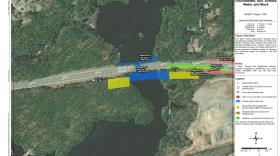Officials in Kingston say they’ll wait for more data before taking action on potential water contamination around a long-dormant Superfund site.
The Ottati and Goss Superfund site, off Route 125 near the Newton town line, is surrounded by campgrounds, homes, businesses and a popular swimming and fishing area, Country Pond.
Between the 1950s and 1980s, the site housed a business that cleaned chemicals out of steel drums and sold the drums for reuse.
That process contaminated soil, sediment, groundwater and surface water at the site with a range of chemicals, including cyanide, pesticides and PCBs. Cleanup for the initial contaminants was extensive and ended years ago.
But in the past few years, the Environmental Protection Agency has begun testing Superfund sites for PFAS chemicals.
These industrial chemicals, used for decades in a plethora of consumer goods and commonly-used firefighting foams, have been linked to serious health effects, including some cancers.
In late 2018, during a routine review, the EPA says the chemicals turned up in monitoring wells at the Kingston site at levels up to 5,600 parts per trillion.
The state groundwater cleanup standard for PFAS is 70 parts per trillion. Some federal research suggests the chemicals may pose health risks at even lower levels.
At a selectmen’s meeting with a few concerned neighbors Monday night, EPA project manager Jim Brown said the contamination in the monitoring wells is “undeniably” coming from the Superfund site.
He also said the contaminated groundwater generally appears to be flowing in the direction of Country Pond, the swimming and fishing area. But he says, over the years of monitoring, the EPA has not found that other contaminants migrated from the site into drinking water wells.
However, the contamination that existed at the site before remediation did appear to migrate into Country Pond. The EPA's original 1987 Record of Decision for the site, dictating the terms and method of clean-up, says pollution in the 1970s appeared to lead to "fish kills in Country Pond, dying vegetation along [adjacent] South Brook, and skin irritation of swimmers in Country Pond.”
Brown says the EPA doesn’t yet have the data to confirm whether PFAS from the site poses a public health risk, and he appeared to downplay the high levels of PFAS that were found.

“The PFAS levels that we’re talking about, in the PFAS world, are high,” Brown said. “But [5,000 parts per trillion] is 5 parts per billion. For most of our contaminants of concern at this site, 5 parts per billion is the goal.”
In the coming weeks, he says, state and federal officials will test adjacent drinking water wells – and surface waters in and near the swimming pond – to see if the PFAS does pose a threat. Results of those tests will be out in late May or early June.
“Depending on the results that we get back in June, we might have to expand the sampling effort to an even bigger area,” Brown said.
Brown called Country Pond a “bonafide swimming exposure scenario” and said the EPA would notify the town immediately if any “significant” contamination is found in the upcoming tests.
Selectmen say they’ll wait on that notification or for final test results before considering any new restrictions on swimming or fishing at the pond.
And state officials said they will immediately provide bottled water if any residents are found to have unsafe levels of PFAS in their drinking water wells.
The EPA is due to transfer control of the aging Superfund site to the state this fall. The businesses that contaminated the site settled their liabilities there years ago, and the state also now owns the property.
The town of Kingston declined to buy the site years ago – out of concern, selectmen said Monday, that new contamination would someday turn up.
“It just seems like what was a great success story seems to be a never-ending saga that we’re going to have to deal with,” said selectman Kevin St. James at Monday’s meeting.
Brown, with the EPA, said the site could still end up a “success story.”
He added that this is the first Superfund site he knows of where PFAS contamination has emerged in the midst of a transfer process to the state.








